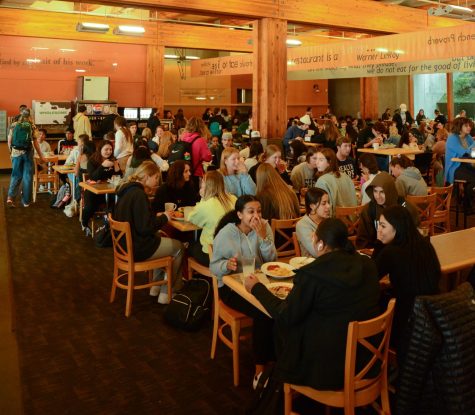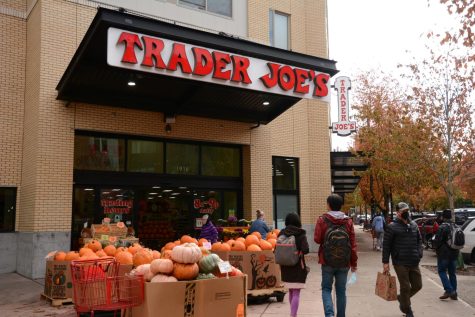Culinary creativity versus campus connection
Do students miss out on learning life skills by eating at Gwinn?
October 15, 2021

To eat at Gwinn or not to eat at Gwinn, that is the question.
Students are faced with a multitude of decisions when preparing for college. The obvious choice for many is to sign up for a meal plan. But if students knew the potential benefits of learning to cook, would they still think a meal plan is the best option?
In the case of senior economics major Ben Slevin, preparing his own meals has led to a newfound interest.
“I would say that I do enjoy not having a meal plan,” said Slevin. “Because I don’t, I am kind of forced to get creative creating new meals and different things for me to eat. It’s something that I’d like to be able to learn and develop because I know I’ll be cooking for myself for a long time. And I actually love to cook.”
Without the option of cooking for himself, perhaps Slevin would not have discovered his culinary passion.
“I figured [cooking] was something I’ve always somewhat enjoyed, but I never did a ton of it because I never had to growing up,” said Slevin. “It was really last year [when] I lived on campus in the apartments and I didn’t have a meal plan then. I was really able to start learning to cook different meals.”
For senior physiology major Graycen Leonard, the benefits of preparing her own meals far outweigh the hassles.
“I’m not restricted on the times I eat, and [getting] to cook for myself often saves money,” said Leonard.
Another unexpected virtue that Leonard discovered through cooking for herself is patience.
“It takes time, though the line for Gwinn sometimes took a long time so I don’t think it’s, like, more time,” said Leonard.
These revelations have come to Slevin and Leonard after two years of consuming food at Seattle Pacific University, though many new students are still deciding whether to depend on a meal plan in the future.
For some, such as freshman Henry Moe, eating at Gwinn is very beneficial when balancing a busy schedule.
“If I didn’t have a meal plan it would be one more thing that I’d have to worry about. It’s definitely easier coming into SPU having food provided,” said H. Moe.
Like many other freshmen, H. Moe does not have a car on campus, which makes it less convenient to buy groceries. Not having to worry about shopping and cooking relieves some of the stress freshmen face in the transition to living on their own.

Eating at Gwinn offers students the opportunity to establish new connections, which is vital for those who are adjusting to their new environment. For freshman Emily Adell, forming relationships at SPU has been one of the greatest advantages of having a meal plan.
“It’s really fun getting to eat with your friends,” said Adell. “I feel like if you didn’t have a meal plan, you wouldn’t be around people as much.”
Unfortunately for students with dietary restrictions, such as freshman Kelsey Moe, the selection at Gwinn is a bit limited.
“I’ve been a little bit disappointed. They do have a lot of good options, but gluten free, that’s a lot harder,” said K. Moe, “and there’s been a couple times when I think something doesn’t have wheat in it, but then it does.”
Though there are benefits on both sides, ultimately it truly depends on each individual’s priorities. For some, college is a chance to prepare for the ‘real world.’ For others, they looked forward to making new connections and a bridge for taking this stage of life gradually.
“In college you have so many things you’re trying to do at once,” said K. Moe. “Cooking for yourself is probably better for the future, but also it’s like a time in life when you can have a break from that.”

























































































